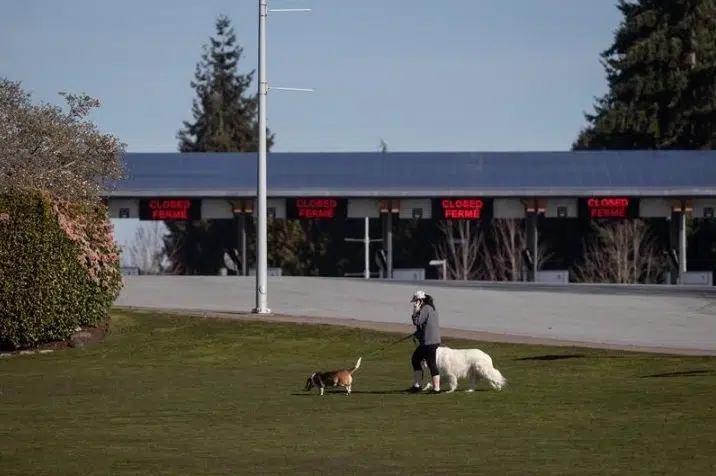OTTAWA — Canadians and their governments scrambled on Thursday to come to grips with the COVID-19 pandemic as case numbers rose, social distancing ramped up, and everyday life morphed into an abnormal new normal that could last months.
Amid growing economic turmoil, workers across the country have been idled at home, the U.S.-Canada border is set to close to all “non-essential” travel and airlines have drastically curtailed operations, leaving thousands of travellers stranded abroad.
“There’s no doubt, these are uncertain times,” Prime Minister Justin Trudeau said as he urged people to self-isolate.
Trudeau gave no timeline for how long the “difficult and extraordinary” measures now in place will need to last, saying experts have suggested weeks to months. He also said full details of the border closure with the U.S. were still being worked out but should come in a day or so.
The prime minister said he had also spoken with Air Canada and WestJet about finding ways to help Canadians stranded overseas get home.
Ontario reported a jump in cases on Thursday — 43 new ones — bringing its total to 257. Canada has now seen more than 700 cases, with nine deaths. Seven of the fatalities have occurred in British Columbia, which has also surpassed the 200-case mark.
Hundreds of doctors, nurses and activists have also called on provincial governments to ensure immediate access to free health care for new arrivals. In an open letter to Ontario’s premier and health minister, the group OHIP For All says urgent action is needed to waive waiting periods for newcomers.
“We are deeply concerned about these pre-existing barriers to health care for uninsured individuals in Canada, and the potential public health implications in the context of a pandemic,” the letter states.
Typically, new arrivals in Canada have to wait at least three months to access provincial health coverage. The newcomers include Canadians returning from longer stretches abroad, recent immigrants, some temporary foreign workers and international students, and undocumented workers. In some cases, people who have lost identity documents may also have trouble getting coverage.
In an ongoing effort to curb the spread, B.C.’s Municipal Affairs Ministry cancelled three municipal byelections and a referendum in four communities. None of the votes have been rescheduled.
Toronto’s transit agency reported a positive COVID-19 test for one of its employees, who worked a shift at a bus maintenance workshop after returning from vacation last week. The person’s infection has prompted as many as 170 TTC employees to self-isolate.
As the country grapples with how best to deal with the disease spread and unprecedented economic fallout, scam artists have been taking full advantage. Some ploys involve sending people messages that they have tested positive for the virus and directing them to call a number, where they are asked to provide credit-card and other information.
The Canadian Anti-Fraud Centre has put out a list of the known COVID-19-related scams. Others flagged include offers of duct cleaning services or filters, threats to disconnect electricity, lists purporting to show who in an area is infected and door-to-door salespeople offering disinfectant services.
The centre advises never to provide financial information under such circumstances.
Public Safety Minister Bill Blair has said essential travel across the border “will continue unimpeded.”
That includes truckers hauling food, medical supplies and other essential goods. It also includes Canadians and Americans who cross the border “every day to do essential work and for other urgent or essential reasons,” Blair said, giving the example of health-care workers.
Colin Perkel, The Canadian Press







